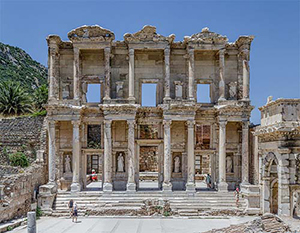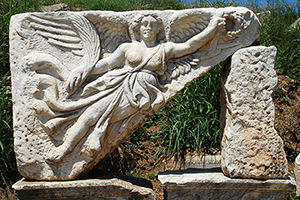In a poem from 1845, Edgar Allan Poe longs for "the glory that was Greece, / And the grandeur that was Rome." But what was Greek glory under Rome? As we shall see, it was in many ways a re-performance of past greatness in the face of a problematic present. For the challenge posed by being proudly Greek under Roman rule involved a tricky sort of negotiation, both with the ruling power and with fellow Imperial subjects. Indeed, it seems to have fostered a climate of intense rivalry in the Greek-speaking Roman East, whose star orators, athletes, and others competed on a grand scale.

Hence competition as a theme central to the course: celebrity sophists battling one another for prestige; cities battling for Imperial favor; ordinary folks seeking to get ahead of, or not to be left behind by, other ordinary folks. There were prizes to be won, but dangers, too, especially those posed by envious rivals. In the end, such concerns generated much cultural production, but they reveal as well fault-lines within ideologies shaping the creation and ancient reception of materials to be studied.
As for topics to be explored, they include:
- Athletic training and competition
- Euergetism, i.e., the race for prestige by wealthy sponsors of public works
- Rhetorical culture, which, for the time and place that concerns us, often goes by the name second sophistic"
- Issues of gender and sexuality in relation to status and prestige
- Literary treatments of the experiences of sub-elites.

Those topics we shall explore through physical and written evidence: architecture, art, writings, inscriptions. Texts, mostly in PDF form, include:
- Philostratus
- On Athletic Training
- Life of Apollonius of Tyana
- Lives of the Sophists
- Alciphron
- Select Letters
- Aelius Aristeides
- Select speeches
- Excerpts from Sacred Tales
- Lucian
- Death of Peregrinus
- The True Story (or, A Trip to the Moon)
- Select declamations
- Polemon
- Physiognomy
- Excerpts from rhetorical textbooks
For a typical class, expect to prepare by reading an assigned text or texts, on which you'll enter a quiz response. Expect As well to participate in discussion. We shall also be doing a lot of group work with speech-writing and -presenting. There will, furthermore, be oral and written orations to present, and along with that, anonymous peer-critiquing. Midterm and final.
